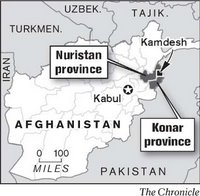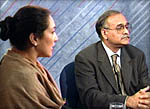You don't modify a noun with another noun.
In his state of the union speech, how many people watching noticed that Bush referred to the results of last November's election as producing 'a new "Democrat majority" in Congress?
I did. I notice it every time a semi-literate Republican uses that term. Bush never apologized, of course. (He never apologizes, does he?)All he said on NPR Monday was,
That was an oversight. I'm not trying to needle…. I didn't even know I did it. . . I didn't mean to be putting fingernails on the board. I meant to be saying, Why don't we show the American people we can actually work together? Gosh, it's probably Texas. Who knows what it is? But I'm not that good at pronouncing words anyway.In his case, some may grant his honesty, because he is the worst-spoken American president. But Maura Reynolds, writing in today's Los Angeles Times is not willing to cut him that slack. She says it's a deliberate slurring of the Democratic Party to refer to it as the 'Democrat Party'. Reynolds quotes Daniel Weiss, chief of staff to Rep. George Miller (D-Martinez):
It's a long-standing intentional partisan political slight. It's kind of like flashing colors in a gang. It's code. It says, 'I'm one of you, I'm a right-wing conservative.'The issue of whether it is a slur to refer to the Democratic Party without the "-ic" has become an irritant. It comes at a time when Democrats and Republicans are trying to figure out whether they can work together, after years of fierce partisanship in the nation's capital.
Roderick P. Hart, a professor of communications and government at the University of Texas in Austin explains:
The word 'democratic' has such positive emotional valence … so they politicize it to use it as a term to describe a group of political rivals.Hart says that "Democrat Party" is not common usage in Texas and notes that the only people who use it were "sitting Republican legislators."
But Reynolds has done her research:
The use of the term "Democrat Party" goes back decades. One explanation sometimes offered is that Republicans began to use it to hint that corrupt Democrats were not terribly "democratic" and had no right to use that word to describe themselves. Others say it was adopted because it sounds annoying and echoes the word "bureaucrat," with its negative connotations.Reynolds gives Roderick Hart the last word:
Whatever the initial impulse or rationale, the term became controversial as far back as the 1950s. Sen. Joseph McCarthy (R-Wis.) famously used it to deride Democrats during his hearings investigating whether Communists had infiltrated the U.S. government. During the 1956 Republican convention, the usage was so common that it prompted the New York Times to report that dropping the "-ic" had become official party policy.
"'Democratic' as an adjective is not descriptive of the party as it exists today," GOP spokesman L. Richard Guylay explained in that report, referring to allegations of vote-fixing by the Democratic Party's political machine in large cities. "I can't consider the party of the Pendergasts or Tammany Hall as a democratic party."
In 1957, writing about the phenomenon in American Speech, the quarterly journal of the American Dialect Society, scholar Ignace Feuerlicht wrote: "It will be interesting to see whether 'Democrat Party' will stay with us or go out of existence again or be revived and revitalized at intervals just before successive national elections."
Feuerlicht seems to have been prescient: A search of a database of presidential speeches and remarks shows that use of the term has increased during election seasons and has been aimed primarily at partisan audiences.
President Reagan used it more in 1984, the year of his reelection campaign, than at any other time in his presidency. In the case of President Bush, the term shows up in his remarks more in 2004 and 2006 — both election years — than during the rest of his time in office.
In fact, Bush's usage of the term increased dramatically last year; according to the American Presidency Project, based at UC Santa Barbara, the president was recorded using the term 22 times in 2006 — more than in the previous five years of his presidency combined.
The term also is commonly used by other Republican leaders. On Monday afternoon, the office of the top GOP leader in the House, Minority Leader John A. Boehner of Ohio, issued a news release asking, "What is the Democrat strategy in Iraq?"
Some Democrats doubt that the president is truly unaware of the pejorative tone of the term, but others acknowledged that it might have become such common parlance among Republican politicians that Bush used it without understanding its origin or undertones.
It sounds illiterate to me. It's a noun used to modify a noun, and everyone knows you use an adjective to modify a noun.There you have it, Folks: the reason why English isn't the official language of the American people is that almost half of our political 'leaders' haven't mastered it yet.
Herein endeth Lesson #2!











 Well, at least this time he didn't do the Bush Bounce or smirk or wink. He almost looked presidential. However, he did manage to fool some of the people again into a small rise in support for his war.
Well, at least this time he didn't do the Bush Bounce or smirk or wink. He almost looked presidential. However, he did manage to fool some of the people again into a small rise in support for his war.





